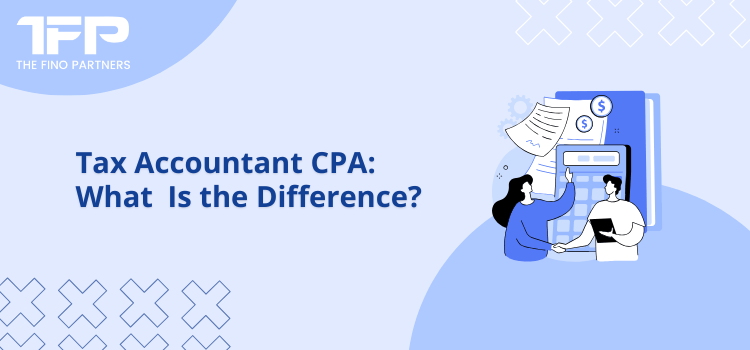As tax season approaches, many of us will turn to professionals for assistance with managing our finances. Two of the most consulted experts in this area are tax accountants and Certified Public Accountants (CPAs). While these terms may be used interchangeably, the roles are different in many ways. This impacts the kind of service you get as a client, the legal standing of the professional, and the way tax planning and finances are handled.
The following article explains the differences between tax accountants and CPAs so that you can decide which practitioner is best for your financial goals.
What Is a Tax Accountant?
A tax accountant is a financial professional who prepares tax returns and offers advice on tax-related issues. Tax accountants specialize in working with individuals, small businesses, and organizations to comply with federal, state, and local tax laws. Most have an accounting, finance, or economics background but may or may not have professional certifications.
The job of a tax accountant is to assist their clients in accurately managing the taxation system, but, nonetheless, their roles and responsibilities are more or less the same. This involves recognizing deductions, estimating liabilities, and providing methods of best reducing tax responsibilities. Tax accountants tend to stay informed about any modifications occurring in the legislation pertaining to the taxes as a means of serving clients with better opportunities, and they can work independently, in small firms or in large accounting organizations.
Although tax accountants can be sharp when it comes to tax codes and filing, they typically cannot represent you at the IRS unless they obtain separate qualifications like an Enrolled Agent (EA). This is great for straightforward finances where someone may just want to file their taxes right and on time.
What Is a CPA (Certified Public Accountant)
A CPA, or Certified Public Accountant, is an accountant who has already taken and passed the challenging Uniform CPA Examination and met various other state requirements with respect to education and experience. CPAs are licensed professionals who are subject to strict regulation by state boards of accountancy, where they must undergo continuing education to keep their license.
While most people associate CPAs with preparing taxes, CPAs provide a variety of services. Apart from taxes, they can perform financial audits, business consulting, and estate and retirement planning. The most important difference between a CPA and tax professional is that only CPAs are licensed to represent clients before the IRS for audits, appeals, and collection matters. The rigorous training resulting in this legal recognition makes the CPA valuable in both tax and financial complexity.
Frequently, licensed CPAs are engaged in financial reporting, budgeting, forensic accounting, and even mergers and acquisitions. They are able to be more than tax preparers — they are able to serve as long-term strategic advisors for both private and business clients. Various CPAs are even niche-specific, giving them power to help deliver financial solutions the direct manner in which an industry will need to follow appropriate regulations and trends.
What Are the Differences Between a Tax Accountant and CPA?
Education and certification are where the differences between a tax accountant and a CPA start. A tax accountant typically possesses a four-year accounting degree or a related degree. While it is not a requirement, some tax accountants decide to further add to their credentials with a designation, such as Enrolled Agent. On the other hand, a CPA has to meet more rigorous standards, such as completing 150 semester hours of education — often a master’s degree — gaining work experience, and passing a comprehensive national exam made up of multiple parts. This guarantees that CPAs are held to a higher standard of skill and ethics.
As far as services go, tax accountants mainly perform tax return preparation and filing, season-specific advice, and compliance assistance. However, CPAs have a wide range of activities. They are trained to deliver audits of financial records, forensic accounting, investment and retirement plan guidance, and business decision consultation. They offer year-round financial oversight and planning rather than just during tax season.
One of the more critical distinctions is legal power. Tax accountants can help with tax filings and taxes, but they typically do not have an inherent right to represent clients before the IRS (unless they have specific additional certifications). In contrast, CPAs have full representation rights, which means they are an absolutely vital resource in the event of an IRS audit or legal tax dispute.
The last factor that can be decisive is the price. Tax accountants are usually lower in price and the best option for more basic tax requirements. While CPAs tend to be more expensive than other types of tax preparers on average, much of their expertise comes in handy when contending with complex tax situations, meaning greater savings in the long run. For client who appreciate custom tax planning, CPA services can be worth it in terms of tax savings, risk mitigation and strategic financial guidance.
When Is It Right to Use a Tax Accountant?
For people with a simple financial picture, a tax accountant may be enough. Tax Accountants – If all you need is help to file your annual tax return or to keep your financial records in order, then a skilled tax accountant can do the job. This is especially helpful in the case of salaried employees, freelancers or small business owner with few deductions and simple income sources. Using a tax accountant can help you get through the forms and deductions without having to pay the higher prices of paying a CPA. And for many, particularly during the tax-preparation window, this method strikes a reasonable balance between cost and service.
When Should You Choose a CPA?
You might want to hire a CPA if your financial life gets a little more complicated. They might own a business, have real estate, their income might be complex, or they may have estate planning or retirement planning needs. If you need professional representation before the IRS or have to undergo an audit, CPAs are also your best bet. Due to their thorough practical training and legal authority, they seem to be the ideal professionals equipped to deal with complex financial situations and offering ongoing advisory services. Having a CPA on hand helps especially businesses with budgeting, forecasting, and future planning.
Choosing Between Tax Accountant and CPA?
Whether you need to decide whether to hire a tax-accountant or a CPA ultimately comes down to the scope and complexity of your financial needs. A tax accountant is probably the right choice for seasonal assistance at low cost if your tax situation is simple. The help they can give you with regard to filing, and compliance could be competent and timely. But if you want expansive financial service, like long-term planning, business consulting or representation in front of the IRS, a CPA can give you that assurance and expertise.
Also Read | Best CPA Accounting Firms in United States for Tax and Audit Services
Conclusion
The selection of a person Tax Accountant CPA to serve under an appropriate capacity must be done carefully, as the role and his/her credentials must be aligned with your personal needs, or the needs of your business. You can begin with a tax accountant, and as your financial situation progresses, transition to a CPA. The trick is in realistically expecting how much you need right now and preparing for tomorrow's scale or more complexity. The right financial professional at The Fino Partners will do wonders when it comes to the ways you manage your money and avoid taxes over the years.




























